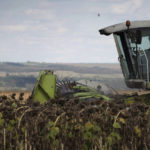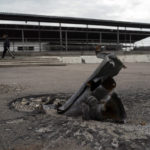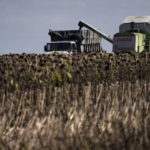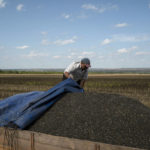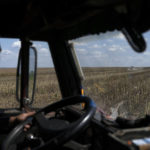Front line farming: Bombs disrupt critical Ukraine industry
Sep 20, 2022, 1:49 PM | Updated: Sep 21, 2022, 4:11 am
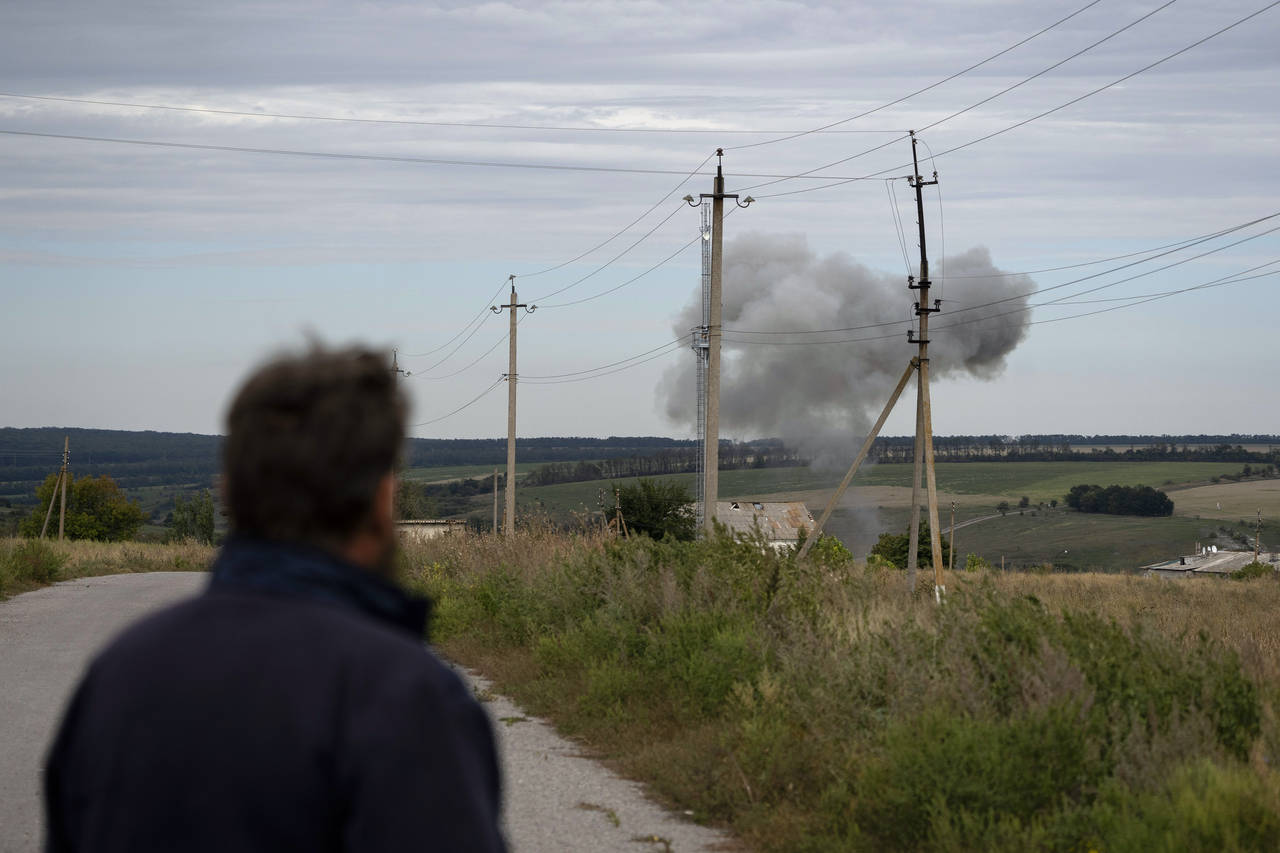
Viktor Lubinets, an agronomist at the Veres farm, looks at smoke rising in the air following a explosion in Novomykolaivka, eastern Ukraine, Saturday, Sept. 10, 2022. Returning to sowing and harvesting "will be difficult, very difficult," said Lubinets, an agronomist at the Veres farm. Even if the fighting ends, the fields must be cleared of unexploded ordinance and shrapnel before they can be worked. (AP Photo/Leo Correa)
(AP Photo/Leo Correa)
NOVOMYKOLAIVKA, Ukraine (AP) — An unexploded rocket sticks out of a field, and another is embedded in the ground of the farm compound. Workers found a cluster bomb while clearing weeds, and there’s a gaping hole in the roof of the shrapnel-scarred livestock barn.
All work has halted on this large eastern Ukrainian farm, whose fields and buildings have been hit so many times by mortars, rockets, missiles and cluster bombs that its workers are unable to sow the crater-dotted land or harvest crops like wheat.
Returning to planting and harvesting “will be difficult, very difficult,” said Viktor Lubinets, who handles crop production at the Veres farm. Even if the fighting ends, the fields must first be cleared of unexploded ordnance and shrapnel.
And the fighting is far from over. The roar of an incoming projectile fills the air, the nearby detonation shaking the ground and sending a plume of black smoke into the sky. Lubinets barely flinches.
“I’ve got used to it. It was frightening during the first couple of days, but now — a person can get used to anything,” the 55-year-old said, the smoke dissipating behind him. “And we have to work. If we give all this up, we will abandon, other farmers will abandon, what will happen then?”
Agriculture is a critical part of Ukraine’s economy, accounting for about 20% of gross national product and 40% of export revenue before the war, according to the U.N. Food and Agriculture Organization. The country is often described as the breadbasket of Europe and millions rely on its affordable supplies of grain and sunflower oil in Africa, the Middle East and parts of Asia where many already face hunger.
But Russia’s invasion in late February has dealt a heavy blow, damaging farmland, crops, livestock, machinery and storage facilities, as well as severely hampering transport and exports.
The FAO estimated in July that preliminary damage to the industry ranges from $4.3 billion to $6.4 billion — 15% to 22% of the total value of Ukraine’s pre-war agriculture sector, estimated at $29 billion.
The Veres farm is a stark example. Its 5,700 hectares (14,085 acres) of land would usually grow wheat, barley, corn and sunflowers, and it had 1,500 cattle.
But its location made it particularly vulnerable in what has been largely an artillery war. It lies in an almost direct line between the strategic city of Izium, seized by Russian forces in early April and retaken by Ukraine in September, and Kramatorsk, the largest city in the eastern Donetsk region still in Ukrainian hands.
The farm complex has been hit 15 to 20 times, Lubinets says, and he’s lost count of how many times the fields have been struck. The grain storage has been shelled, the electricity generation facility was destroyed, and multiple rockets rained down on the cattle barn — empty since the livestock was sold off as the war started. Of a prewar workforce of 100 employees, most were evacuated and only about 20 remain.
Workers managed to plant wheat, but they didn’t have time to harvest it. The crops burned down during a bombing on July 2.
Lubinets was devastated. As an agronomist, he had been looking forward to examining the results of five new types of wheat they had planted, part of annual research on crop performance.
“All this research work was destroyed,” he said. “You see, how can I feel? How can a person feel if you wanted to do something, but somebody came and ruined it?”
Some farms in the area have been luckier. Nearly 10 kilometers (six miles) to the southwest of Novomykolaivka, a combine harvester moves methodically up and down a field, slicing dried sunflowers from their stalks and pouring their black seeds into waiting trucks.
The war forms a jarring backdrop. The machine is scarred by shrapnel from an exploding rocket, and a nearby field is mined. Helicopters skim over the sunflowers and corn, and fighter jets streak low above the rolling plains.
Farmworkers, breaking for lunch in the field, ignore the booms of distant shelling.
“It became very hard and scary to work during the war, because you don’t know what to expect and where,” said 36-year-old worker Maksim Onyshko. “The war has never brought anything good. Only sorrow and harm.”
Sergiy Kurinnyi, director of the 3,640-hectare KramAgroSvit farm, said it had been risky to plant sunflowers in May without knowing whether the front line would engulf the fields.
“We could see with our naked eyes the military action,” Kurinnyi said. “So there was a risk of whether we could harvest these crops, but we decided to take this risk.”
It paid off, with good weather helping produce a decent yield from the 1,308 hectares of sunflowers. They also planted 1,434 hectares of wheat, 255 hectares of barley, 165 hectares of winter rapeseed and some animal feed crops. They lost 27 hectares of wheat to a fire triggered by bombing but managed to harvest the rest.
A rocket strike killed 38 of the farm’s 1,250 cattle in April, prompting managers to sell off most of the remaining herd, keeping 215 cattle in its dairy production. The next day, a rocket hit the equipment storage area, destroying a grain harvester and damaging other equipment, Kurinnyi said.
Calculating the total loss from the war isn’t easy, Kurinnyi said, but he estimated that about 10 million hryvnias (about $270,000) had been lost from crop production and around 1 million hryvnias ($26,700) for the 38 cattle killed in the strike.
With Ukraine’s counteroffensive pushing the front line further east, he said they were more confident of being able to plant and were starting to prepare the soil for winter crops.
But for the heavily damaged farm where Lubinets works, a return to the fields is still far off.
“We had been living calmly before this war, we had been working, we had … achieved something, had been striving to do something — and now what?” he said. “Everything has been damaged, everything has been destroyed, and we have to rebuild all this, starting from scratch.”
___
Follow AP’s coverage of the Russia-Ukraine war at https://apnews.com/hub/russia-ukraine and the food crisis at https://apnews.com/hub/food-crisis.
Copyright © The Associated Press. All rights reserved. This material may not be published, broadcast, rewritten or redistributed.


